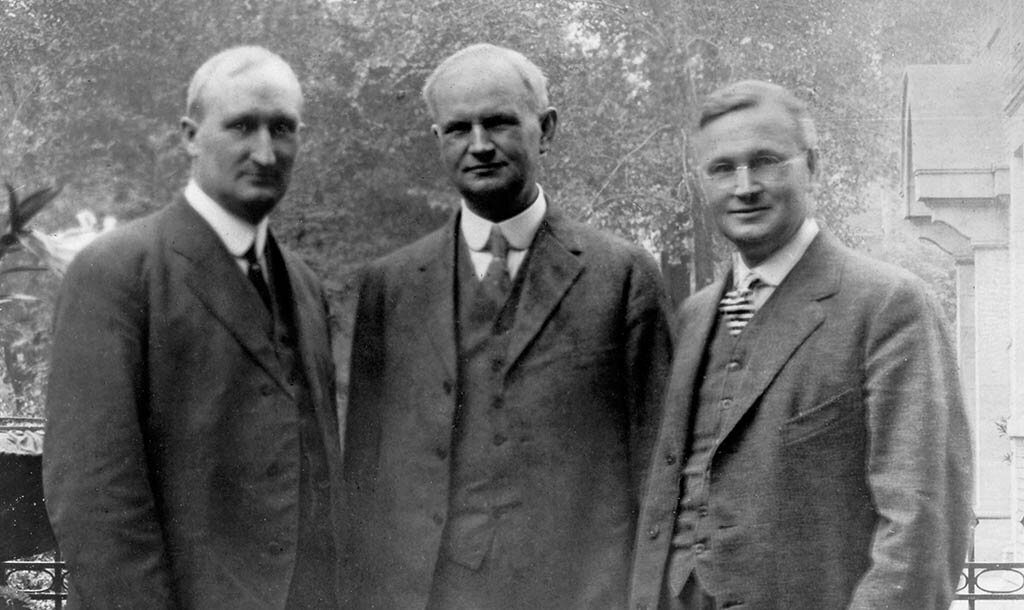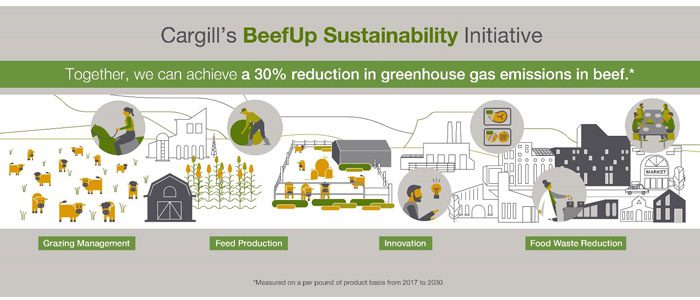Cargill, a giant in the agricultural industry, has long been a topic of interest for investors and environmentally conscious individuals alike. With its extensive reach in the global food supply chain and commitment to sustainability, many are curious about the company’s stock, environmental impact, and investment alternatives. The enigma surrounding Cargill’s stock status and the possibility of an IPO further piques our curiosity.
In this blog post, we delve into Cargill’s stock status, the company’s business, and its environmental impact. For those eager to invest in the agricultural sector, we explore Cargill’s publicly traded competitors and agricultural ETFs as alternatives. By the end of this journey, you will have a better understanding of Cargill’s position in the market and the investment opportunities it presents, including the potential for Cargill stock.
Key Takeaways
Cargill is a privately-owned company with no publicly traded stock.
Cargill has strong financials and offers alternative investments for exposure to the agricultural sector, such as Archer Daniels Midland (NYSE: ADM) and Bunge Limited (NYSE: BG).
The company has taken various sustainability initiatives to reduce its environmental impact while promoting global food security.
Cargill’s Stock Status
Cargill is one of the largest private companies in the agricultural industry and does not have any publicly traded stock. Being a privately-owned company, the public cannot trade Cargill stock, and thus, determining the Cargill stock price is not applicable.
With an annual revenue of over $134.4 billion in 2021, Cargill’s financial stability and massive size have allowed it to remain a private company and avoid entering the stock exchange.
Related Article: Is Chick-Fil-A Stock Publicly Traded? – An In-Depth Look At The Stock Price And Net Worth
Family Ownership

The Cargill family owns approximately 88% of the company’s shares, while the remaining shares are held by employees through an employee stock plan and the company’s private shareholders. Family ownership enables the retention of control and negates the need for public trading. The family’s desire to maintain control, along with Cargill’s huge assets, are key reasons why the company has remained one of the largest private businesses and has not pursued an IPO. This unique situation has allowed the family to maintain ownership without the pressures of being publicly traded.
Financial Stability
The company’s impressive assets contribute to its financial stability, which is recognized with an ‘A’ rating and a stable outlook by Fitch Ratings. In addition to an A rating with both Standard & Poor’s (S&P) and Fitch, Cargill holds an A2 rating from Moody’s. This financial stability is further demonstrated by the company’s impressive annual revenue of $134.4 billion in 2021.
Given Cargill’s financial stability, there is no immediate need for the company to consider a public offering. The company’s size and favorable debt rating, along with the family’s control, allow it to remain a private entity without the need for public trading.
| Year | Cargill Annual Revenue (in USD billions) |
|---|---|
| 2023 | $177 |
| 2022 | $165 |
| 2021 | $134.4 |
| 2020 | $114.6 |
| 2019 | $113.5 |
A Glimpse into Cargill’s Business
Cargill is a global leader in the agricultural, livestock, and processed foods industry. Operating in 70 countries and marking its presence in over 100, Cargill’s global reach is extensive. The company provides a wide array of products and services, including:
Food ingredients
Industrial ingredients
Food processing
Livestock ingredients
Agricultural commodities
Cargill’s annual revenue ranks it among the world’s highest revenue-producing companies, and it employs 155,000 individuals across 70 countries.
From its humble beginnings in 1865, Cargill grew to become one of the largest corporations in the agricultural and processed foods industry. The company’s purpose is to “nourish the world in a safe, responsible, and sustainable way”. To achieve this, Cargill operates various aspects of its business as Fast-Moving Consumer Goods (FMCG), ensuring that food is produced, processed, and distributed in a sustainable and responsible manner.
Agricultural Commodities
Cargill plays a significant role in the agriculture and livestock industry, accounting for 25% of U.S. grain exports and 22% of America’s meat supply. The company provides grains such as wheat, corn, barley, and sorghum, as well as oilseeds like soybeans and palm oil. In addition to these offerings, Cargill trades and distributes other agricultural commodities, making it a major player in the global market.
Cargill’s role in the agricultural sector is truly global with operations in 70 countries and a presence in over 100, including Cargills Ceylon Plc. As a result, the company has a substantial influence on the worldwide food supply chain, ensuring that food is produced, processed, and distributed in a sustainable and responsible manner.
Food Processing
Cargill’s food processing business involves the processing of agricultural commodities into high-quality ingredients for the production of various food and beverage products. They process:
Beef
Poultry
Value-added meats
Egg products
These products are processed for food makers, food service companies, and food retailers. The company’s processing services encompass the production of ingredients for food, beverage, and industrial applications.
On a global scale, Cargill:
Sources, stores, trades, processes, and distributes grains and oilseeds
Offers insights and resources to assist businesses in succeeding within the changing food industry
Maintains its position as a global leader in the agricultural and processed foods industry
This commitment to food processing and distribution allows Cargill to maintain its position as a global leader in the agricultural and processed foods industry.
The Possibility of a Cargill IPO
Although there is presently no plan for Cargill to become publicly traded, the potential benefits and drawbacks of a Cargill IPO are worth considering. Over the years, some Cargill stockholders have advocated for an initial public offering, but the company has not yet pursued this option. In 2011, Cargill did make its 64% stake in The Mosaic Company available to its shareholders, allowing them to exchange Cargill stock for Mosaic shares.
Investors must weigh the pros and cons of a Cargill IPO, taking into account the following factors:
The company’s family ownership
Size
Financial stability
Even though a Cargill IPO is not on the cards at present, it continues to capture the interest of investors and industry observers.
Related Article: How To Invest In Subway Stock: A Guide For Investors
Reasons Against an IPO
There are several reasons against a Cargill IPO. First and foremost, family ownership allows the company to maintain control over its operations and decision-making, which could be compromised if the company were to go public. Insider satisfaction is another factor to consider, as remaining a privately held company allows Cargill to focus on keeping insiders, such as employees and stakeholders, satisfied, leading to better long-term stability and loyalty within the company.
Additionally, Cargill’s size and financial stability play a role in its decision to remain private. By avoiding an IPO and maintaining its privately held status, Cargill may have a competitive advantage over its publicly traded competitors, such as Bunge Ltd. and Archer-Daniels-Midland Co., in terms of flexibility and strategic decision-making.
Potential IPO Benefits
Despite the reasons against a Cargill IPO, there are potential benefits if the company were to go public. An IPO would provide access to public capital markets for financing, allowing the company to raise funds for investments and other activities. Increased liquidity for shareholders would also be a benefit, as it would enable them to transact shares of the company with greater ease.
Moreover, a Cargill IPO would offer enhanced transparency and accountability through the obligation to disclose financial information to the public, a common requirement for a publicly traded company. This increased visibility and recognition in the stock market could potentially boost the company’s stock price and shareholder value.
Although a Cargill IPO isn’t in the current plans, potential benefits and drawbacks should be taken into consideration by investors before making any investment decisions.
Investing in Cargill Alternatives
For investors looking to gain exposure to the agricultural and processed foods market without directly investing in Cargill, there are alternative options available. Bunge Limited and the Archer Daniels Midland Company are two publicly traded corporations. Both companies operate in the food processing and agricultural sectors, including being among the largest fertilizer companies. These companies offer investors the opportunity to invest in the agricultural sector while also diversifying their portfolio.
Considering the inherent risks associated with any investment, it’s crucial for investors to conduct their own research prior to making any investment decision. By thoroughly evaluating all available options, investors can make informed decisions and potentially capitalize on the opportunities presented by Cargill’s competitors.
Archer Daniels Midland (NYSE: ADM)
Archer Daniels Midland (NYSE: ADM) is a global food processing and commodities trading corporation with strong financials. The company engages in the production and processing of agricultural commodities, including grains, oilseeds, and other agricultural products, and operates through various segments. ADM offers an extensive array of products and services, such as grain and oilseed processing, animal feed production, and food ingredients.
In addition to its robust financial standing, with a market capitalization of over $30 billion and a dividend yield of 2.5%, Archer Daniels Midland (NYSE: ADM) is also dedicated to minimizing its environmental footprint. The company has implemented measures to decrease water consumption and invest in renewable energy sources.
Bunge Limited (NYSE: BG)
Bunge Limited (NYSE: BG) is a leading agribusiness and food company that connects farmers and consumers to provide essential food, feed, and fuel to the world. The company focuses on ensuring that food is produced, processed, and circulated in a sustainable and responsible manner, with a commitment to linking farmers to consumers in order to improve global food security.
As part of its dedication to minimizing its environmental footprint, Bunge Limited (NYSE: BG) actively strives to decrease its greenhouse gas emissions, water consumption, and waste. Furthermore, the company invests in sustainable agriculture and renewable energy projects, demonstrating its commitment to both the global food supply chain and the environment.
Exploring Agricultural ETFs
Agricultural ETFs provide an alternative investment option for those looking to gain exposure to the agriculture market without directly investing in Cargill. These exchange-traded funds offer exposure to the agriculture industry, encompassing commodities such as wheat, corn, and soybeans, as well as agricultural companies. Notable agricultural ETFs include Invesco DB Agriculture Fund (DBA), Teucrium Wheat Fund (WEAT), and VanEck Agribusiness ETF (MOO).
Investing in agricultural ETFs, such as Teucrium Corn Fund (NYSE: CORN), Teucrium Wheat Fund (NYSE: WEAT), and Teucrium Soybean Fund (NYSE: SOYB), offers investors exposure to agricultural commodities, allowing for diversification of a portfolio and hedging against inflation. Investors should, however, be cognizant of the risks linked to investing in these ETFs, including volatility and tracking errors, and should undertake comprehensive research before making any investment decisions.
CORN, WEAT, and SOYB
CORN, WEAT, and SOYB are ETFs that provide exposure to agricultural commodities, tracking futures contracts on corn, wheat, and soybeans, respectively. By investing in these ETFs, investors can gain exposure to the agricultural sector in a diversified manner, without directly investing in a single company such as Cargill.
However, potential investors should be aware that the nature of agricultural commodities can lead to volatility risks when investing in ETFs. Furthermore, the ETFs may be subject to tracking errors, which can potentially lead to losses. As with any investment, investors should conduct thorough research and consider the risks involved before making a decision.
Cargill’s Impact on the Environment
Cargill’s environmental impact has been a topic of concern, with the company being reported to have violated US environmental laws, such as spills of waste into creeks and streams. Furthermore, the company has been subject to criticism for deforestation in the Cerrado and its environmental and human rights record. Despite these concerns, Cargill has implemented sustainable practices to mitigate its impact on the planet.
In response to these concerns, Cargill has undertaken various sustainability initiatives to improve its environmental footprint. These initiatives aim to minimize the company’s impact on the environment while also promoting global food security.
Deforestation Concerns

Environmental campaigners have raised concerns about Cargill’s role in deforestation, particularly in relation to its supply chain. Allegations have been made that Cargill has been culpable in deforestation in the Amazon rainforest and other areas as a result of its supply chain activities.
While these concerns are valid, Cargill has responded by implementing sustainability initiatives to tackle deforestation issues. The company has pledged to achieve zero deforestation in its supply chain by 2020, demonstrating its commitment to environmental sustainability and responsible business practices.
Sustainability Initiatives

Cargill has implemented a range of sustainability initiatives to minimize its environmental impact and improve global food security. These initiatives include:
The BeefUp Sustainability initiative to reduce beef emissions by 30% by 2030
Advocating for the right crops to enhance food security
Concentrating on deforestation with farmers on the ground
Constructing resilient communities
Backing the United Nations Sustainable Development Goals
Cargill’s implementation of these sustainability initiatives illustrates its dedication to reducing its environmental footprint and enhancing global food security. The company’s efforts to address deforestation concerns and improve its environmental performance showcase its dedication to responsible business practices and a sustainable future.
Summary
In conclusion, Cargill’s stock status, business, and environmental impact present a complex and intriguing picture of a private company with a global reach in the agricultural and processed foods industry. While a Cargill IPO is not currently planned, there are alternative investment options available, such as investing in the company’s publicly traded competitors or agricultural ETFs.
By understanding Cargill’s position in the market, its stock status, and the potential investment opportunities it presents, investors can make informed decisions about their investment strategies in the agricultural sector. As the world’s demand for food continues to grow, companies like Cargill will play a vital role in shaping the future of the global food supply chain and the environment.
Frequently Asked Questions
Does Cargill have stocks?
No, Cargill does not have stocks available for purchase as they are a private company.
Is Cargill publicly listed?
Cargill is a private company and not publicly listed, meaning investors cannot purchase its shares.
Who owns Cargill company?
Cargill is owned by the Cargill-MacMillan family, whose descendants of founder W.W. Cargill have maintained ownership with a 88% stake in the company since it was founded in 1865.
Can I invest in Cargill stock directly?
Unfortunately, it is not possible to invest directly in Cargill stock, as the company is privately-owned and does not have publicly traded shares.
What are some alternative investment options to Cargill?
Investors looking for alternative investments to Cargill can consider publicly traded competitors like Archer Daniels Midland and Bunge Limited, or agricultural ETFs such as CORN, WEAT, and SOYB.




